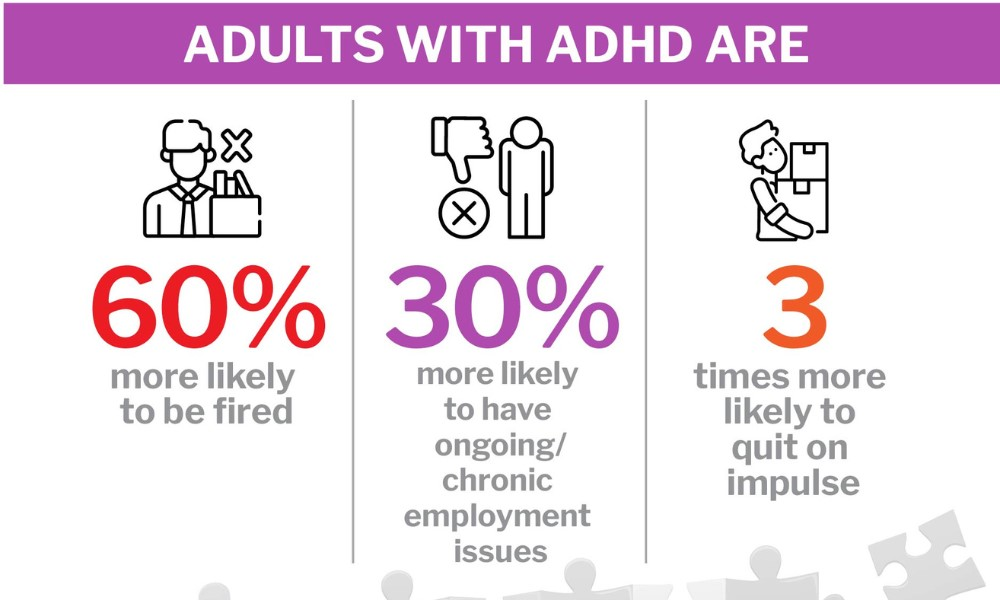
'My creativity is, in fact, not creativity at all – it’s thanks to the different tools I have'

It’s estimated that upwards of 15% of the global population are neurodiverse. Despite this, two in five are nervous about revealing this to their employer or their colleagues, according to new data from Instaprint.
Among the respondents who confirmed having a neurodiverse diagnosis, 16% fell into the 18-24 age group, 56% were aged 25-34.
In contrast, among individuals aged 45 and above, 54% are currently in the process of seeking a diagnosis in late adulthood.
But why the secrecy? What’s the hidden stigma surrounding attention deficit hyperactivity disorder (ADHD) and other neurodiverse traits? And, more importantly, how do employers eradicate that stigma?
Having just been diagnosed herself, Lisa Dodwell-Greaves feels like she finally has an answer to the questions she’s had for years. However, securing that diagnosis was a challenge — when she first suspected she had ADHD, she sought out a psychiatrist who was less than helpful.
“I should have known,” she tells HRD. “This lady had a six-week waiting list – normally you’re waiting up to six months, so that was a red flag. When I finally sat down with her, she told me I had no mental health issues – bearing in mind I already had anxiety – and that I was just a busy mom.”
The incident shook Dodwell-Greaves, an HR consultant, but nevertheless she was determined to get to the root of her feelings.
“In the end, I found a better psychiatrist who gave me the formal diagnosis and I began taking medication.”
Immediately, Lisa saw a result.
“I couldn’t believe it,” she tells HRD. “I couldn’t believe the difference I saw in days. I had more energy, more focus, more time to spend with my kids. It’s night and day.”
Undiagnosed ADHD can be stressful for many people, with individuals struggling to understand why their mind seems to work differently than their peers. However, once they have that diagnosis, ADHD has been compared to a super power.

Peter Ampe wants to reframe aspects of the autism spectrum as talents – not as conditions or differences. As creative director of publishing house Famous Grey, he believes his diagnosis of ADHD helped his career, not hindered it.
Ampe’s own experiences with ADHD spurred him to pen a best-selling book, Great Minds Think Unalike: The Benefits of ADHD, Autism, Dyslexia and OCD, along with his wife. The book, first published in Flemish, was immediately recommissioned for a second edition and is now on the market in English.
What inspired Ampe’s authorship was his diagnosis, alongside his son, of autism spectrum and ADHD.
“Suddenly it hit me,” he tells HRD. “My creativity is, in fact, not creativity at all – it’s thanks to the different tools I have. The book is based a lot on my personal experience. I had the impression that I’m not the only one out there with ADHD but without a diagnosis. There’s a lot of people on the spectrum that haven’t been diagnosed – that have had this since school. When the book came out, I had a lot of people resonating with the message and finally realizing why they’ve had the difficulties they’ve had.”
After giving a talk at Cannes Lions Festival, alongside the likes of Paris Hilton and the Black Eyed Peas, Ampe had a woman approach him in floods of tears.
“They came up to me and started crying,” he tells HRD. “Because she finally understood why she had been running into certain issues for a great deal of her life. For me personally, my autism gives me a different perspective on things. I look at things in a different way which is perceived as creative by others. I also have a keen eye for detail – and a lot of stubbornness – all linked to the diagnosis.”
Ampe describes it as an energy flowing out of him – and that energy often energizes others too. This is typical of employees with ADHD – looking at problems in a different way and using their unique eye to solve issues others can’t. For employers, this is an asset not a condition or illness.
Dodwell-Greaves tells HRD that for employers wanting to help people who suspect they have ADHD, it’s important to already have some resources in place.
“I remember when I was struggling with it and I approached my manager,” she tells HRD. “We had a good relationship - but when it came to accommodations, she would say, ‘What do you need?’ When you're in the throes of mental illness, you don't know what you need. What would really help is if there were already options there available.”
It’s always better to be prepared – and with issues such as ADHD, it’s important to have guidelines already in place. That way, when an employee approaches you, you have the resources to hand. And, as Ampe tells HRD, it all comes back to fostering a culture of care, compassion and concern.
“Everyone deserves a stage,” says Ampe. “Because people with these abilities are extremely unique in the workplace. But they all come with a manual – and that's what companies should learn. There’s still a lot of ignorance around diversity. If leaders understand neurodiversity better, they can create a more inclusive workplace – one based on respect, confidence and tolerance.”
What is ADHD? Attention deficit hyperactivity disorder is a condition, or trait, that includes symptoms such as being restless and having trouble concentrating. Symptoms of ADHD may include a shorter attention span, perceiving or solving problems in a different way, and a high attention to detail.
Is ADHD considered a disability? ADHD is considered a disability in Canada and under the Americans with Disabilities Act as well as the Rehabilitation Act of 1973. However, many with ADHD believe it to be more of a ‘super power’ than a ‘condition’.
How do I know if I have ADHD? Don’t self-diagnose. If you suspect you could have ADHD, contact your local doctor for advice. Remember, ADHD isn’t an illness – and people with ADHD often lead successful, happy lives. The key is in getting that diagnosis and understanding what works best for you as an individual.